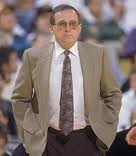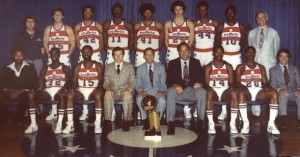 In NBA history, only 10 coaches have won more games than Dick Motta, although that is misleading.
In NBA history, only 10 coaches have won more games than Dick Motta, although that is misleading.
When he left the NBA after the 1996-97 season, his 935 victories were the third-most. He’s been passed by seven coaches while not coaching.
Unlike two recent inductees into the Naismith Memorial Basketball Hall of Fame – Don Nelson and Jerry Sloan – Motta also has that all-important championship. And it was an impressive one because by no means did his 1977-78 Washington Bullets have anywhere close to the best talent in the league.
 That season, in fact, they won only 44 regular-season games. They had fewer great players than the Julius Erving-led Philadelphia 76ers and less size and explosiveness than the George Gervin-led San Antonio Spurs – the two top seeds in the Eastern Conference – yet beat both of them in the playoffs.
That season, in fact, they won only 44 regular-season games. They had fewer great players than the Julius Erving-led Philadelphia 76ers and less size and explosiveness than the George Gervin-led San Antonio Spurs – the two top seeds in the Eastern Conference – yet beat both of them in the playoffs.
Motta then won a coaching duel with Lenny Wilkens – who is in the Hall of Fame – and the Bullets overcame a 3-2 deficit to win the final two games of the 1978 NBA Finals and a championship.
An objective look at those accomplishments suggests rather strongly that Dick Motta belongs in the Hall of Fame. But he is not, for one reason and one reason only:
He stayed too long – six years too long to be exact. Had Motta left when he was 55, he would have had a record of 808-750. That’s not too far off Red Holzman’s 696-604 record, or Jack Ramsay’s 864-783. And there is no doubt Bill Sharman is one of the all-time great players and executives in basketball history, but he is in the Hall of Fame as a head coach and he had a 333-240 record as an NBA coach (and 133-113 in the ABA).
The problem with Motta’s resume is that because of jobs with young teams in Sacramento and Dallas (during a second tenure), his losses exceed his wins. His 1,017 losses are fourth-most in NBA history behind only Wilkens, Bill Fitch and Don Nelson. Wilkens and Nelson, however, had a winning percentage better than .500. Motta and Fitch did not, and neither is in the Hall of Fame.
Motta’s record in particular produces a compelling debate. Unlike Fitch – who benefitted from coaching Larry Bird’s Celtics and Hakeem Olajuwon’s Rockets – Motta never coached a team that was favored to win a title. The issue is whether a coach more losses than wins be in the Hall of Fame? I asked two friends who served time on the voting committee and the results were mixed.

 “I think above-.500 is immaterial in this case,” Mike Monroe of the San Antonio Express-News said. “Every team in the league uses offensive stuff Motta pioneered and I think that merits his inclusion.”
“I think above-.500 is immaterial in this case,” Mike Monroe of the San Antonio Express-News said. “Every team in the league uses offensive stuff Motta pioneered and I think that merits his inclusion.”
But Jack McCallum, formerly of Sports Illustrated, says the record is part of the big picture.
“I just don’t see how a coach with that kind of record gets in,” McCallum said. “I think he would’ve had to have been so innovative — inventor of the fast break, inventor of the 1-3-1 zone or something like that. I probably wouldn’t vote for him.”
Motta was innovative, but more as a coach who perfected parts of the game that existed. No one was better at getting a 6-5 forward like Mark Aguirre, putting him in the low post and running an offense that repeatedly got Aguirre open shots.
Motta’s set offense was one of the best in NBA history, and although some judged him to be conservative because his teams were deliberate and disciplined, Motta encouraged his players to shoot as many 3-pointers as they could.
“I like the 3-pointer, especially when you don’t have much height,” Motta would say. “If you make it, it’s a psychological blow to the other team. If you miss it, the ball hits the rim so hard that it bounces out and gives you a better chance to rebound.”
Motta also was one of those rare college coaches who was successful in the NBA. NBA teams had rarely hired college coaches in the late-1960s, but Motta was part of a wave in 1968 that included Ramsay and a couple of years later, Cotton Fitzsimmons.
